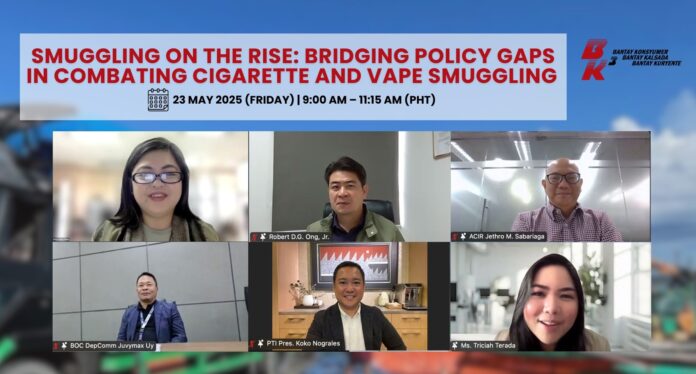Government officials, industry leaders and other key stakeholders in the tobacco industry are advocating for a dedicated inter-agency task force to combat the illicit tobacco trade.
The call for action follows a roundtable discussion organized on Friday by advocacy group Bantay Konsyumer, Kalsada, Kuryente (BK3), which focused on the illicit tobacco trade’s detrimental effects on the national economy and public health.
Bureau of Internal Revenue (BIR) assistant commissioner Jethro Sabariaga said the country has lost an estimated P40 billion to P45 billion, or around 20 percent of its revenue, due to illicit trade. To counter this, Sabariaga cited the need for a multi-sectoral task force and automatic information-sharing among agencies for more efficient operations.
“We must collaborate in our efforts against this pervasive problem,” Sabariaga said.
“The BIR will support the lead agency for this and provide resources to help in this endeavor against illicit trade,” he said.
Sabariaga said the “overarching objective has always been to bring justice to the business environment. We have to make sure that those registered players, heavily regulated as they are, are not being prejudiced.”
Bureau of Customs (BOC) deputy commissioner Juvymax Uy echoed the sentiment for intelligence-sharing, expressing hope that the Philippine National Police and the Armed Forces of the Philippines would be included in efforts to combat tobacco smuggling at national borders.
Uy said the BOC is addressing limited enforcement in free trade zones by deploying more X-ray machines in these areas as part of its export and customs risk management system. The BOC also plans to implement an automated export declaration system.
“By implementing this, the volume of raw materials imported in the country by tobacco companies will now be easily matched in the system with the volume of exports from those companies to the country,” Uy said.
Philippine Tobacco Institute (PTI) president Jericho Nograles urged the government to develop a clear policy statement against illicit tobacco trade and highlighted the necessity of a dedicated tobacco-focused law enforcement agency. Nograles noted that the issue isn’t a lack of law enforcement but rather “overwhelmed” agencies already facing manpower shortages.
“In creating this task force, we support tighter controls and updated rules provided that they are developed in consultation with all stakeholders, including legitimate manufacturers and exporters, and they are guided by transparency, due process, and proportionate enforcement,” Nograles said.
BK3 convenor Karry Sison underscored the need for a more proactive law enforcement approach to curb tobacco smuggling. She pointed out that the availability of cheap, unregulated tobacco products due to illicit trade has led to an increase in smoking prevalence, from 18.5 percent in 2021 to 23.2 percent in 2023.
“Strengthened enforcement and ensuring justice shall provide a more viable solution to illicit trade. The failure to hold transgressors accountable means that smugglers operate with impunity to the detriment of the government, its people, and public health,” Sison said.








